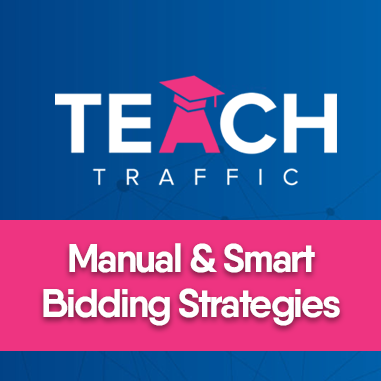What is the difference between manual and smart bidding strategies?
The word “Smart” has always been involved with introducing innovations that would be more convenient to its consumer. “Smartphones” is a good example due to its convenient and trustworthy features that a “dumb” phone lacks. This is also inherent to bidding strategies.
Manual bidding strategies let you manually set the bids on keywords, audiences, or placements. By using this strategy, you will have full control over what targeting you wish to spend more on. Common manual bidding strategies are Manual CPC (Search ads), Manual CPV(Video Ads), and Enhanced CPC.
Smart bidding strategies, on the other hand, utilizes the data that has been gathered by your ads and automatically apply bids to your targeting according to the data. Common smart bidding strategies are Target CPA, Target ROAS, and Maximize Conversions.
Putting both strategies side by side, Smart bidding will rapidly gather more results compared to Manual Bidding but will most likely spend the budget faster so expect a slight bump on your ad spend once you opt into smart bidding.
Before you impulsively switch your campaign to smart bidding, you must also understand that smart bidding strategies are not as easy as it sounds to pull off. You must understand how much you are consistently paying for the conversions/leads and the campaign must have generated enough data for the smart bidding to work on its own.
You must also remember that it also might not work the first time. Even experienced PPC experts sometimes have challenges with smart bidding strategies.
How and when to apply smart bidding strategies?
The biggest mistake people make when it comes to getting started with smart bidding is launching without enough data.
For smart bidding to be effective, Google needs data. That is conversion data.
So experienced advertisers opt-in to smart bidding strategies when a campaign has run for a good period of time and has generated at a minimum of 30 conversions in a 30 day period.
You also need to know how much you are paying for a conversion. That is your current Cost per Conversion.
To prevent your campaigns from getting disastrous results from smart bidding, we recommend the following.
A ) Analyze the data – Compare different date ranges and understand how much you are paying for the conversions/leads.
B ) Control your budget – Determine whether your budget can handle smart bidding. Make sure your campaign’s daily budget is higher than your cost per conversion.
C ) Split testing – Create experiments on the campaign before implementing it to the live campaign.
You can also always test smart bidding by launching an ‘experiment’.
An ‘experiment’ will split test the different bidding strategies in a controlled environment, so you can easily compare the performance.
Once you have a stable and performing smart bidding campaign, just make sure to still check your search terms and add negative keywords regularly to ensure that your campaign will have minimal unwanted ad spend.
Why do smart bidding campaigns stop working; how to fix them?
A common scenario we have noticed is that smart bidding strategies can tend to stop working after a couple of months, so don’t panic. There are workarounds.
Smart bidding strategies depend on data that is being gathered by your campaign. So if you find that there has been a gradual decline in impressions and thereby performance, this will only keep happening if you continue to use smart bidding.
Reverting back the campaign to Manual CPC is a viable solution in this scenario. This will help your campaign to gather net-new and stable data for the smart bidding strategy to use onwards. We often stay with manual CPC for a good 30 days just to be sure.
As always keep on track of your cost per conversion. You will need this in the future once you opt-in to smart bidding strategy especially for Target CPA and Maximize Conversions.
